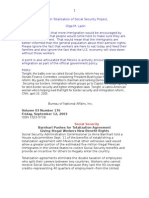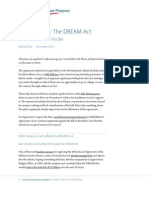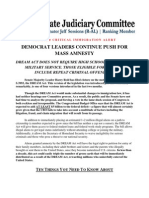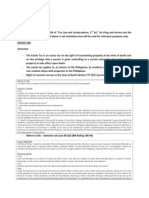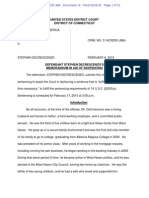Immagration Bill Contents..
Immagration Bill Contents..
Uploaded by
chuckftaCopyright:
Available Formats
Immagration Bill Contents..
Immagration Bill Contents..
Uploaded by
chuckftaCopyright
Available Formats
Share this document
Did you find this document useful?
Is this content inappropriate?
Copyright:
Available Formats
Immagration Bill Contents..
Immagration Bill Contents..
Uploaded by
chuckftaCopyright:
Available Formats
By M.
STANTON EVANS, Investor's Business Daily La Raza In Line To Pocket Reform-Bill Slush Funds
The avowed purpose of the immigration bill passed by the Senate and pending in the House is to provide a "path to citizenship" for the illegal immigrants in exchange for tough new enforcement measures that would prevent other such incursions in the future. But buried deep within the immigration bill are hidden multimillion-dollar slush funds for left-wing nonprofit groups to provide services to the estimated 11 million illegal immigrants now in the U.S. Once enacted, the slush funds would total almost $300 million over three years and grow over time. Reviewing the massive legislation, it's obvious that lawyering would be needed. The 1,100-page proposal is a network of legal requirements and protections, waivers and exceptions, including a new "provisional immigrant" status (the first phase of legalization for illegals), appeals of adverse rulings, stays of deportation, applications for work visas, and countless other such guarantees. Within this thicket of new rights are features that would vastly increase the flow of immigrants to perhaps 30 million or 40 million over the next decade. One is a set of "chain immigration" clauses, legalizing the spouses and children of illegals. Another is the Dream Act, fast-tracking legal status for aliens of any age who came here before they were 16 (how this would be proved is not clear). A third is a "blue card" temporary visa that could be converted to permanent status and used by future illegals to get legal in a hurry. Of course, a Spanish-speaking immigrant would likely know nothing of this maze of loopholes, benefits and protections and would on his own be unable to exploit them. So the bill sets up a fund of $50 million to aid illegals seeking "provisional" status, filing appeals, blocking efforts at deportation, obtaining naturalization, and so on. The groups receiving the $50 million to give such assistance would be nonprofit "immigrant- serving" organizations whose staffs have "demonstrated qualifications, experience and expertise in providing quality services to immigrants." Agents of such groups would be paid by the government to guide the illegals through the intricate processes in the legislation.
'Chock-Full' Of Pork
The bill provides a sizable slush fund for leftward groups in the immigrant serving, advocacy and lobbying business. As Sen. John Cornyn, R-Tex., puts it, the bill is "chock-full of de facto earmarks, pork barrel spending, and special interest sweeteners." Though the nonprofit agencies getting the money aren't named in the bill, their identities can be
deduced from the history and politics of the issue. Foremost among such groups is the National Council of La Raza (meaning "the race," or alternatively, "the people"), a group that opposes current U.S. immigration laws, defends illegals, and long promoted amnesty measures. It's also an organization with significant leverage at the Obama White House and its former senior executive helped draft the Senate bill. La Raza is already a recipient of federal grants and contracts running at $8 million to $10 million per year and would arguably be at the head of the line to receive new funding. A second, allied group, the Mexican American Legal Defense and Education Fund, says it receives no federal money but would likely qualify for subsidies under this legislation.
Laundry List Of Services
As to the services to be provided by such groups, the legislation lists: Supplying information to illegals and the public on "the eligibility and benefits of registered provisional immigrant status." Completing application forms and petitions for immigrants, obtaining documents and other relevant data. "Applying for any waivers" from restrictions on illegals and qualifying family members. Helping individuals seeking to "adjust their status" to permanent residence. "Applying for United States citizenship ..." Among the features of the bill in terms of immigration enforcement are provisos concerning drunken driving in the U.S. Two prior convictions for this offense would not disqualify an immigrant for legalization, but a third offense, after the bill is passed, may disqualify a migrant from becoming a citizen. Similar rules apply to counterfeiting or altering passports: three such instances are forbidden, meaning two would be permitted. As to selling or forging materials used in making passports, the bill says 10 such instances are verboten, that nine won't be a problem. Another provision would protect aliens who have been "ordered excluded, deported or removed" from the country. Such aliens, under the bill, "may apply for registered provisional status," and, by this one step, avoid removal. Pending approval of their applications, the aliens "shall not be considered unlawfully present" unless the Secretary of Homeland Security says so. This is unlikely, at best. The secretary, or an immigration judge, could stop deportation of illegals on humanitarian or family-
unity grounds or simply in "the public interest" if they decide to do so. "Public interest" is essentially undefined in the legislation.
Litigation Explosion
As noted by Sen. Jeff Sessions, R-Ala., "such open-ended waivers could all but ensure mass litigation and the end of immigration enforcement." Other parts of the bill go beyond amnesty and waivers to guarantee sanctuary and safe havens for illegal immigrants. The sanctuary part (Section 3721) says immigration officers may not conduct "enforcement actions" at "sensitive locations," except in the emergency circumstances, or with written advance permission from higher levels. These no-enforcement zones are hospitals, health clinics, schools (vocational schools, universities and others are included), organizations helping children, pregnant women or people with disabilities, churches, synagogues and mosques and any other "sensitive location" later designated by the federal bureaucracy. For illegal immigrants who manage to get arrested, there are provisos also (Section 3715) to secure their release. Detainees, who cannot get a bond, can be turned over to "secure alternative" providers until they get a hearing. These "secure alternatives" turn out to be, once more, "non-governmental community- based organizations" that would provide "community-based supervision programs" for detainees. So the nonprofits that get the federal funding could also get custody of their clients. In these respects and others, the legislation echoes the agenda of La Raza (which long promoted the language of "comprehensive immigration reform" and a "path to citizenship"). Previously such efforts have been made by this group, with some federal dollars, but chiefly with funds from foundations, unions and corporations. Now, if the new bill passes, such activities could be much more generously backed by the taxpayers. Another set of grants will go to "eligible organizations" that provide assistance to illegals seeking "blue card" or "provisional" status, collecting proof of eligibility and giving other such assistance. What's Another $100 Million? One section creates a "New Immigrant Council," including representatives of nonprofits "with legal and advocacy experience working with immigrant communities," to "introduce and integrate" new immigrants "into the state." The bill authorizes an additional $100 million $20 million a year for five years to finance these efforts. Thus a second slush fund is created. A third grant program appears in a later section, funding an outreach "campaign" to inform immigrants and the public about employee "rights, responsibilities and remedies" in the legislation.
This recruitment project too would be contracted to nonprofits, at a cost of $120 million $40 million a year over a three-year span. While the Senate bill is advertised as a "tough, conservative" measure, the largely unnoticed sanctuary funding and La Raza clauses may be the real point of the legislation. This seems likely since the bill was steered through the Senate by the Obama White House. Overseeing a team of executive branch bill-drafters ensconced in the Dirksen Senate Office Building, guiding the legislative process, was Obama director of domestic policy Cecilia Munoz, the leading presidential staffer on immigration issues.
All For La Raza
Before assuming her job with the White House, Ms. Munoz was a senior policy analyst at La Raza. Thus a former La Raza official has been pushing through legislation that advances the La Raza program and could potentially fill its coffers. This connection becomes even more eye-catching when we note that La Raza and Munoz were also involved in the last big amnesty go-round, in 1986, which supposedly traded legalization of illegals (then about 3 million) for tougher new enforcement. In that case, the legalization happened but the enforcement didn't. La Raza and similar groups lobbied for greater leniency toward illegals and against the employer sanctions that were the law's main enforcement mechanism. Ms. Munoz in 1990 wrote a long La Raza essay saying legalization was good and should be expanded, but that sanctions against hiring illegals were discriminatory and should be abandoned. She said further that groups like La Raza were unfairly burdened in providing costly legal services to immigrants a problem that could obviously be solved by the slush funds in the Senate measure. She called her 1990 essay "Unfinished Business." It looks as though the current bill completes the business La Raza launched back in the 1980s. Evans is a veteran journalist and author whose latest book is "Stalin's Secret Agents." Research for this article was underwritten by the American Media Institute (americanmediainstitute.com), a nonprofit investigative news service.
You might also like
- The Slave Next Door: Human Trafficking and Slavery in America TodayFrom EverandThe Slave Next Door: Human Trafficking and Slavery in America TodayRating: 4 out of 5 stars4/5 (7)
- Trivia Questions Womens MonthDocument4 pagesTrivia Questions Womens Monthtian89% (9)
- Secrets of The SSNDocument43 pagesSecrets of The SSNsheriff770100% (17)
- Sample Motion To Vacate Default Under Rule 55 (C) in United States District CourtDocument3 pagesSample Motion To Vacate Default Under Rule 55 (C) in United States District CourtStan BurmanNo ratings yet
- Case Folder GuideDocument94 pagesCase Folder GuideRanier Factor Aguilar100% (2)
- Mas-Immigration-Law-Offers-Cornucopia-To-Immigration - Lawyers/#Ixzz2Onu5X8ZbDocument4 pagesMas-Immigration-Law-Offers-Cornucopia-To-Immigration - Lawyers/#Ixzz2Onu5X8ZbAgnes GamboaNo ratings yet
- One Year Later: A Look at SB 1070 and Copycat Legislation - NCLR FACT SHEETDocument16 pagesOne Year Later: A Look at SB 1070 and Copycat Legislation - NCLR FACT SHEETUrbanYouthJusticeNo ratings yet
- Community Problem Report Final PaperDocument10 pagesCommunity Problem Report Final Paperapi-2835514830% (1)
- Midterm PaperDocument6 pagesMidterm Paperapi-319627780No ratings yet
- Anti-Human Trafficking FactsheetDocument1 pageAnti-Human Trafficking FactsheetMIRA CoalitionNo ratings yet
- Will Truth Prevail?: in Its Current Form, The Whistle-Blowers' Bill Will Simply Not DoDocument1 pageWill Truth Prevail?: in Its Current Form, The Whistle-Blowers' Bill Will Simply Not DoAravindVRNo ratings yet
- Challenge Immigrant RightDocument5 pagesChallenge Immigrant RightMh Nurul HudaNo ratings yet
- No One Is Illegal! Tear Down The Wall! For Free Movement Across Borders!Document6 pagesNo One Is Illegal! Tear Down The Wall! For Free Movement Across Borders!JohnnBrownNo ratings yet
- Comprehensive Immigration Reform 3Document5 pagesComprehensive Immigration Reform 3api-272895240No ratings yet
- The Day Freedom BrokeDocument16 pagesThe Day Freedom BrokeKregenerNo ratings yet
- SB1070 Activist ToolkitDocument11 pagesSB1070 Activist ToolkitAmnesty WestNo ratings yet
- Petition For Rulemaking Submitted To The Department of HomelandDocument44 pagesPetition For Rulemaking Submitted To The Department of HomelandNational Day Laborer Organizing NetworkNo ratings yet
- Legal Aid Doc Something To Do With M V A Case Cornerstone Jan AprDocument40 pagesLegal Aid Doc Something To Do With M V A Case Cornerstone Jan AprCharlton ButlerNo ratings yet
- On Totalization of Social Security Project, Olga M. Lazin FyiDocument6 pagesOn Totalization of Social Security Project, Olga M. Lazin FyiOlga LazinNo ratings yet
- From The American Peoples Encyclopedia © 1952, EditedDocument6 pagesFrom The American Peoples Encyclopedia © 1952, EditedefjkeNo ratings yet
- Persuasion Effect Project Final Revision-2Document16 pagesPersuasion Effect Project Final Revision-2api-589370067No ratings yet
- Aderholt Bill Issue BriefDocument2 pagesAderholt Bill Issue BriefFederation for American Immigration ReformNo ratings yet
- Sanctuary Cities: What Is Not Being Done RightDocument17 pagesSanctuary Cities: What Is Not Being Done RightBrandon TranNo ratings yet
- EAPP Major Assessment #4 (17 Lopez II, 18 Manuel, and 27 Quiambao)Document4 pagesEAPP Major Assessment #4 (17 Lopez II, 18 Manuel, and 27 Quiambao)Mamerto LopezNo ratings yet
- Illegal Alien - The Proper TerminologyDocument5 pagesIllegal Alien - The Proper TerminologyFederation for American Immigration Reform100% (4)
- Immigration System in AmericaDocument5 pagesImmigration System in AmericaNeriliz SotoNo ratings yet
- Myth vs. Fact: The DREAM ActDocument6 pagesMyth vs. Fact: The DREAM ActCenter for American ProgressNo ratings yet
- Help Wanted: Calling All HumanistsDocument4 pagesHelp Wanted: Calling All HumanistsjessicagreenNo ratings yet
- Sanctuary Cities Research PaperDocument9 pagesSanctuary Cities Research PaperIsabella de Lima AndersonNo ratings yet
- Immigration Reform Term PaperDocument7 pagesImmigration Reform Term Paperc5ha8c7gNo ratings yet
- Haynes: ForewordDocument3 pagesHaynes: ForewordNew England Law ReviewNo ratings yet
- The Duty of Lawyers - Huffington PostDocument2 pagesThe Duty of Lawyers - Huffington PostfowlercxleudtllaNo ratings yet
- SSRN 3429368Document34 pagesSSRN 3429368lex.dibakarNo ratings yet
- Patrick Clowney - Rogerian Argument RevisedDocument6 pagesPatrick Clowney - Rogerian Argument Revisedapi-316945855No ratings yet
- PCT01 - Introduction To TrustsDocument23 pagesPCT01 - Introduction To Trusts2Plus100% (2)
- Legal Aid in USADocument16 pagesLegal Aid in USASuriya AadilaNo ratings yet
- $18 Billion On Immigration Enforcement Last YearDocument4 pages$18 Billion On Immigration Enforcement Last YearEditorNo ratings yet
- "Sanctuary Cities" and Community PolicingDocument3 pages"Sanctuary Cities" and Community PolicingPublic Information OfficeNo ratings yet
- KENS5 Press Release-HB 3554Document1 pageKENS5 Press Release-HB 3554Andrea CardenNo ratings yet
- Tough LadyDocument3 pagesTough LadyTHE HATMANNo ratings yet
- SB 1070 ThesisDocument8 pagesSB 1070 Thesispattybuckleyomaha100% (1)
- Donald Trump Immigration ReformDocument6 pagesDonald Trump Immigration ReformThe Conservative Treehouse50% (2)
- English Research PaperDocument8 pagesEnglish Research Paperj90091563No ratings yet
- Material Support Waivers Neg FileDocument30 pagesMaterial Support Waivers Neg FileNickNo ratings yet
- Argumentative Essay Sample On ImmigrationDocument5 pagesArgumentative Essay Sample On ImmigrationAmeena AimenNo ratings yet
- The Libertarian Case Against Open Borders by Lipton MatthewsDocument4 pagesThe Libertarian Case Against Open Borders by Lipton Matthewsbartholomew RandNo ratings yet
- (People) Fight For Freedom, Then They Begin To Accumulate Laws To Take It Away From Themselves. Author UnknownDocument4 pages(People) Fight For Freedom, Then They Begin To Accumulate Laws To Take It Away From Themselves. Author UnknownwaltercavalieriNo ratings yet
- Sessions TimelineDocument50 pagesSessions TimelineJoshua GrayNo ratings yet
- DREAM ActDocument5 pagesDREAM ActmichellemalkinNo ratings yet
- Reading This Do You Think A Lawyer or The Attorney General Would Argue For A Persons Constitution Human RightsDocument6 pagesReading This Do You Think A Lawyer or The Attorney General Would Argue For A Persons Constitution Human RightsFrank GallagherNo ratings yet
- Arugement File For ULC (aUTOSAVED) ADocument9 pagesArugement File For ULC (aUTOSAVED) Asubhashni kumariNo ratings yet
- Immigration 1 Running Head: IMMIGRATIONDocument4 pagesImmigration 1 Running Head: IMMIGRATIONTravis OverholtNo ratings yet
- On The Rights of ProstitutesDocument2 pagesOn The Rights of ProstitutesRein GallardoNo ratings yet
- Crit Sociol 2010 Fasenfest 771 4Document5 pagesCrit Sociol 2010 Fasenfest 771 4emilianocarpaNo ratings yet
- Primers and LawDocument108 pagesPrimers and LawJonas CuNo ratings yet
- Paper 2Document17 pagesPaper 2api-310807209No ratings yet
- ImmigrationDocument34 pagesImmigrationFahad AliNo ratings yet
- Silva A2U2 DCDocument4 pagesSilva A2U2 DCjudithsilvacastillo350No ratings yet
- New Colossus Immigration Policy PaperDocument25 pagesNew Colossus Immigration Policy Paperquinn tassinNo ratings yet
- Hell No: Your Right to Dissent in Twenty-First-Century AmericaFrom EverandHell No: Your Right to Dissent in Twenty-First-Century AmericaRating: 3 out of 5 stars3/5 (1)
- From Human Trafficking to Human Rights: Reframing Contemporary SlaveryFrom EverandFrom Human Trafficking to Human Rights: Reframing Contemporary SlaveryRating: 5 out of 5 stars5/5 (1)
- A Conservative and Compassionate Approach to Immigration Reform: Perspectives from a Former US Attorney GeneralFrom EverandA Conservative and Compassionate Approach to Immigration Reform: Perspectives from a Former US Attorney GeneralNo ratings yet
- PDEV 2111.2nd Quarter ExamDocument5 pagesPDEV 2111.2nd Quarter ExamdsdsdNo ratings yet
- AMLA ReviewerDocument5 pagesAMLA ReviewerZamantha Tiangco100% (1)
- NSPE Code of Ethics - Signing PlansDocument4 pagesNSPE Code of Ethics - Signing PlansJoel MinaNo ratings yet
- Credtrans - Uy Tong V CA 1988Document1 pageCredtrans - Uy Tong V CA 1988Richel Dean SolisNo ratings yet
- 2 Republic V YahonDocument6 pages2 Republic V YahonCai CarpioNo ratings yet
- G.R. No. 154291Document13 pagesG.R. No. 154291Joovs JoovhoNo ratings yet
- Interpreting Article 1 of The 1951 Convention PDFDocument24 pagesInterpreting Article 1 of The 1951 Convention PDFMikhaella SollanoNo ratings yet
- Soc2 CJSDocument48 pagesSoc2 CJSjiday23No ratings yet
- Randy David vs. ArroyoDocument12 pagesRandy David vs. ArroyoCyril Diyosa ManaloNo ratings yet
- Outline - Estate and DonorsDocument24 pagesOutline - Estate and DonorsCarlo BarrientosNo ratings yet
- 10people Vs FloresDocument16 pages10people Vs FloresRai-chan Junior ÜNo ratings yet
- Reaction Paper #11Document5 pagesReaction Paper #11Louelie Jean AlfornonNo ratings yet
- Manigbas Vs.....Document8 pagesManigbas Vs.....edgar3juliet30jeda18100% (1)
- A Wedding I Have AttendedDocument3 pagesA Wedding I Have AttendedAliza RashidiNo ratings yet
- 28 - Roxas vs. de Jesus, Jr.Document6 pages28 - Roxas vs. de Jesus, Jr.vince005No ratings yet
- 8 Maza V Turla PDFDocument2 pages8 Maza V Turla PDFUE Law100% (1)
- Draft Rental AgreementDocument3 pagesDraft Rental AgreementMurali EmaniNo ratings yet
- LLB1205 Principles of Constitutional Law II ExamDocument5 pagesLLB1205 Principles of Constitutional Law II ExamKatsigazi NobertNo ratings yet
- Pages From Annex I-2Document1 pagePages From Annex I-2CowdaBoyNo ratings yet
- Lopez - Forgery - Case - FVA014728 - Case Report - San Bernardino MainDocument10 pagesLopez - Forgery - Case - FVA014728 - Case Report - San Bernardino Mainjuanguzman5No ratings yet
- 24) Gimenez V NazarenoDocument1 page24) Gimenez V NazarenodoraemoanNo ratings yet
- Checklist For Schengen ApprovalDocument5 pagesChecklist For Schengen ApprovalPrashant MurtyNo ratings yet
- Loss (Plate Card) - MilallosDocument1 pageLoss (Plate Card) - MilallosJinJiShinNo ratings yet
- Stephen DeCrescenzo DefenseDocument21 pagesStephen DeCrescenzo DefensemtuccittoNo ratings yet
- Vijay Kumar Gupta Vs Kiran Bala 29112019 ChattisgarhHCDocument19 pagesVijay Kumar Gupta Vs Kiran Bala 29112019 ChattisgarhHCMokshha SharmaNo ratings yet
- Application Form: Professional Regulation CommissionDocument1 pageApplication Form: Professional Regulation CommissionAze TitularNo ratings yet
- C9 MarotraoDocument7 pagesC9 MarotraoP NNo ratings yet


















